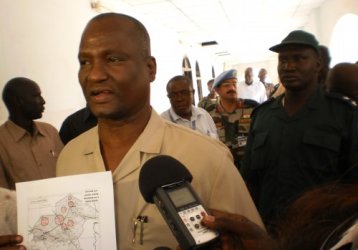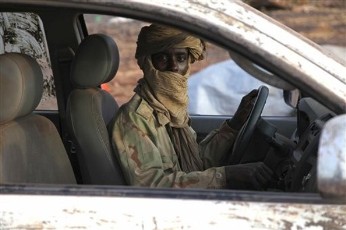Unity State governor denies coordinating with Sudan rebels in Heglig
By Bonifacio Taban Kuich
April 20, 2012 (BENTIU) – The governor of South Sudan’s Unity State, Taban Deng Gai, denied on Friday an allegation broadcast on Sudanese state television that Sudan’s security services had intercepted him having a phone conversation with Sudanese rebels groups operating north of the international in South Kordofan State.

In a statement released Thursday, JEM military spokesperson, Badawi Mosa Al-Sakin, claimed they defeated the Sudanese troops in two positions in Kharsana near Heglig.
“Let them prove my talking with the rebellion group in Sudan. Are they bugging officials phone number[s] in the republic of South Sudan? If so, does international laws give them that right in hacking a sovereign nation?’’, Gai said.
South Sudan split away from Sudan in July last year as part of a 2005 peace deal but many key elements were not implemented including demarcating the oil-rich borders and resolving grievances in South Kordofan and Blue Nile where the SPLA-North fought as part of the SPLA – now South Sudan’s army – during the civil war.
Since the SPLA-North began fighting Khartoum again last year, Khartoum has consistently accused Juba of assisting its former colleagues north of the border. Juba denies this but the Small Arms Survey research group argues that despite the denials Juba and Khartoum are both almost certainly supporting each other’s rebels as proxies.
The UN, US and others have all called on Juba to stop backing the SPLM/A-N, which in November of last year joined with JEM and the two main factions of Sudan Liberation Movement led by Abdel-Wahid Mohamed Nur (SLM-AW) and Minni Minnawi (SLM-MM) to form the Sudan Revolutionary Front (SRF) vowing the overthrow the government.
Since late March the two nations have fought over the disputed oil field of Heglig, with the SPLA holding the area for 10 days before announcing a pullout of the area on Friday. However, shortly afterwards Sudan’s Minister of Defence Abdel-Rahim Mohamed Hussein announced that his forces evicted the SPLA from area.

On April 15 a photo taken by an Associated Press journalist in Heglig showed evidence that JEM soldiers were present at a South Sudanese position in the disputed area.
However, on Friday the Unity State governor told Sudan Tribune that Khartoum’s allegations were lies – an attempt to smear South Sudan as a new sovereign nation.
Gai said the Sudanese president Omer Hassan Al-Bashir’s recent rhetoric – describing the SPLM as “insects”, vowing to remove them from power in South Sudan and teaching the country “a lesson” – was undiplomatic.
The Unity State governor also called on the people of South Sudan to ignore Sudan’s claims that the SPLA’s withdrawal from Heglig has been forced by the Sudan Armed Forces.
Gai said Friday that SPLA forces were still deployed beyond 23 kilometers north of disputed Heglig town.
SAF BOMBING
The Unity State governor accused the Sudan Armed Forces of killing over 75 people in his state using MiG 29 fighters and inaccurate Antonov bombers, where bombs have to be physically thrown out of the back of the plane.
Gai said that the SAF bombings inside South Sudan are retaliation for the SPLA’s capture of Heglig on the 10 April, which Juba claims was in response to SAF attacks on the oil-rich state.
The UN, US and others have condemned the bombing of Unity and Warrap States in recent days but SAF continues to deny it has done so.
With the SPLA’s pullout of Heglig Khartoum has said that Juba will be held responsible for any damages to the area’s oil facilities. Before South Sudan’s occupation of the Heglig it had supplied around half of Sudan’s oil production.
A Sudanese official on Friday said that 40,000 barrels a day from Sudan’s normal 115,000 had been lost due the Heglig’s capture. Due to the haste which the pumps were turned off, regardless of any other damage, it will take some time to resume production.
On Friday Gai repeated South Sudan’s allegation that SAF was bombing the oil field and that it was not to blame for any damage – a position South Sudan is likely to stick to when negotiations between the two sides resume.
It is unclear when this will be. Juba has said it is ready for talks but Khartoum is yet to indicate it is ready to return to the table.
However, it appears that when talks do resume, the ownership of Heglig and compensation for damage to Heglig’s facilities – two new issues – will now be on the agenda.
Despite announcing the SPLA withdrawal from Heglig on Friday South Sudan’s president had previously laid out the circumstances under which he would order them to pull out; assurances that Heglig not be used a base to attack Unity State; UN peacekeepers deployed there until its status could be resolved; and SAF’s withdrawal from neighboring Abyei – another disputed region.
Sentiment in South Sudan, borne out by numerous protests over the last week, has been largely angry at the international community and the head of the UN Ban Ki Moon in particular for their criticism of Juba’s position.
The demonstrators pointed to numerous acts of “aggression” committed against South Sudan and SAF’s occupation of Abyei since May last year, accusing the international community of being harsher on Juba’s nine-month-old government than they have been with Khartoum.
A local woman on Friday told Sudan Tribune that colonial power Britain should be invited by the international community to demarcate the north-south border as it was the UK along with Egypt that granted Sudan independence in 1956.
Gai, who fought the Khartoum government as part of the SPLA during the civil war (1983-2005) said Sudan’s ruling National Congress Party (NCP) were “full of lies and murderer[s]”.
He alleged that after last week’s clashes with SAF at Heglig the SPLA found “a list of coordinates … guiding the aerial bombardments of Sudanese air forces” in South Sudan. The “majority of these places are highly populated areas” in Unity State, he claimed.
(ST)
